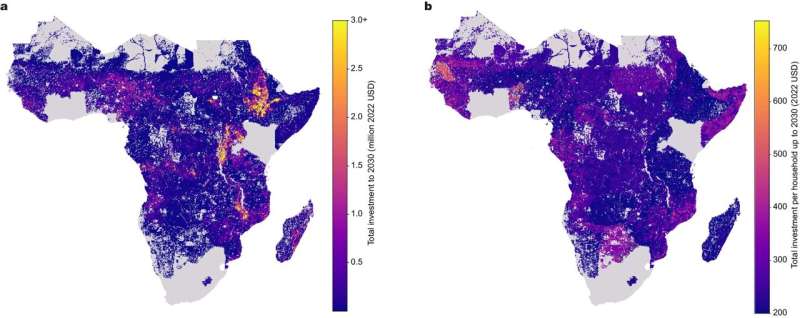This article has been reviewed according to Science X's editorial process and policies. Editors have highlighted the following attributes while ensuring the content's credibility:
fact-checked
peer-reviewed publication
proofread
Carbon pricing and system reliability impacts pathways to universal electricity access in Africa

There is a considerable gap in the rate of improvement in electricity access and where it needs to be to meet UN Sustainable Development Goal 7 (energy access for all). Under this "baseline scenario," several hundred million people are projected to still be without access in 2030 and 2035 without an acceleration of progress.
The reliability of existing and new connections is also a big problem: Existing electricity grids in sub-Saharan Africa in many countries are under strain, with poor reliability experienced by many and this seeing a reduction in the value of access.
The potential role of off-grid solar PV to meet these electricity access plans is potentially underestimated. A new technique that considers a wide range of country-specific factors can identify the places and different electricity demand levels for which off-grid PV is likely to be most cost competitive (useful additional info for policymakers, although these estimates exist already).
Two new aspects are not covered by existing work: reliability levels and carbon prices. Exploring policy interventions (e.g., factoring in a cost for poor reliability) reveals a huge expansion in the use of off-grid PV as the best option.
In addition, introducing a carbon price scheme (relevant for thinking about carbon credits as well as a carbon tax) sees a much greater uptake of off-grid PV in some parts of the continent.
Acknowledging that there is a significant heterogeneity between countries, and regions within countries, the new methods identify the thresholds at which policies might be effective in different parts of the continent.
The paper, "Carbon pricing and system reliability impacts on pathways to universal electricity access in Africa," was published in Nature Communications.
More information: Hamish Beath et al, Carbon pricing and system reliability impacts on pathways to universal electricity access in Africa, Nature Communications (2024). DOI: 10.1038/s41467-024-48450-7


















